Iran Expresses Concern Over Terror In Afghanistan Ahead Of Regional Meeting
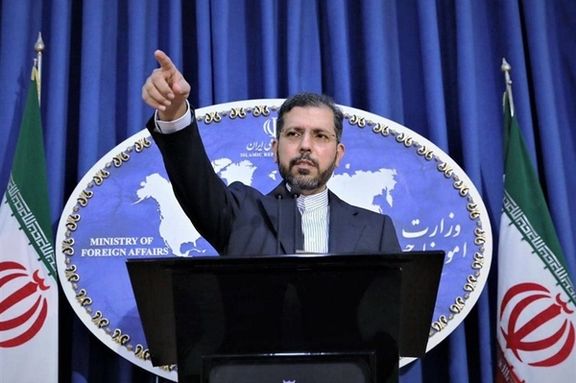
Iran’s foreign ministry has expressed concern about “terrorism, violence and extremism in Afghanistan”, one day ahead of a regional meeting in Tehran.

Iran’s foreign ministry has expressed concern about “terrorism, violence and extremism in Afghanistan”, one day ahead of a regional meeting in Tehran.
Saeed Khatibzadeh on Tuesday told reporters that foreign ministers of Uzbekistan, Tajikistan, Turkmenistan and Pakistan will attend the Wednesday conference of Afghanistan’s neighbors, while China and Russia will take part via video link. The Taliban have not been invited to the meeting.
The spokesman added that Iran’s President Ebrahim Raisi is scheduled to address the conference and a letter from the United Nations Secretary Antonio Guterres will be read.
Regarding the absence of the Taliban, Khatibzadeh said that there were many requests from Afghanistan and elsewhere for participation and this will be decided in the next meeting, which will probably take place in Beijing.
Regarding the agenda of the meeting Khatibzadeh told reporters that a unified message should be sent to “inside Afghanistan” that the country cannot be a “place for violence and terror”.
After two major bomb attacks against Afghanistan’s Shiites, Iran has asked the Taliban to protect civilians and strive for including others in the government.
“A peaceful and stable Afghanistan is a partner in regional cooperation. The people of Afghanistan will accept a government that reflects their will,” he said.
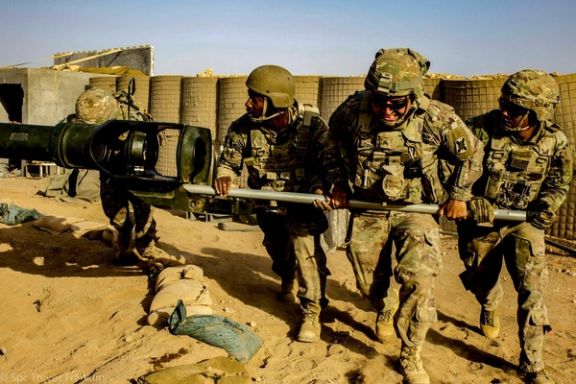
US officials say they believe Iran was behind the drone attack last week at the military outpost in southern Syria where American troops are based.
Officials said Monday the US believes that Iran resourced and encouraged the attack, but that the drones were not launched from Iran. They were Iranian drones, and Iran appears to have facilitated their use, officials said, speaking on condition of anonymity to discuss details that have not been made public.
Officials said they believe the attacks involved as many as five drones laden with explosive charges, and that they hit both the U.S. side of al-Tanf garrison and the side where Syrian opposition forces stay.
Pentagon spokesman John Kirby declined to provide details when asked about the report during a news conference Monday. He called it a “complex, coordinated and deliberate attack” and said the US has seen similar ones before from Shia militia groups that are backed by Iran. But he would not go into specifics and said he had no update on the munitions used in the attack.
Kirby also declined to say if troops were warned ahead of time or whether the US intends to make a military response.
“The protection and security of our troops overseas remains a paramount concern for the secretary,” Kirby said, referring to Defense Secretary Lloyd Austin, “and that if there is to be a response, it will be at a time and a place and a manner of our choosing, and we certainly won't get ahead of those kinds of decisions.

In a rare admission the speaker of Iran’s parliament said Monday, “We could not accomplish anything” with 80 percent of the economy dominated by the government.
In a speech in Mashhad, Mohammad Bagher Ghalibaf, a former top IRGC officer and Tehran mayor, said, “We eliminated people from various areas of public life, or we stratified them”, insisting that without the involvement of large segments of society the Islamic Republic cannot succeed.
Ghalibaf’s remarks come as hardliners loyal to Supreme Leader Ali Khamenei have dominated all three branches of government since February 2020 and have sidelined the loyalist opposition of ‘Reformists’. Ghalibaf himself is accused by former officials and journalists of a role in major corruption schemes in Tehran municipality when he was mayor (2005-2017) and also in suppressing student protests more than two decades ago.
Those who disagreed with the tenants of the Islamic Republic have long been purged by death or exile.
Iran’s economy became dominated by the state after the 1979 revolution when major industries were nationalized in the wake of an Islamic-leftist zeal, and businessman were either jailed, killed or had to flee for their lives.
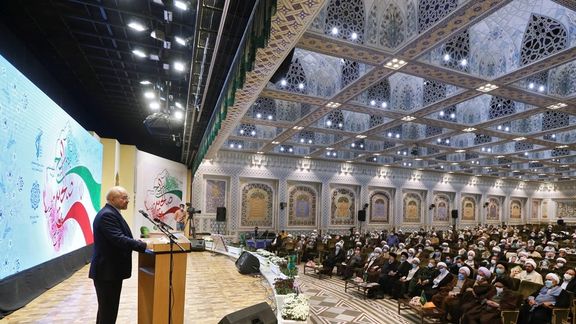
Ghalibaf spoke of alienated youth and asked, “Aren’t these our children…shouldn’t we talk with them?” He also spoke of hardship gripping ordinary workers, saying that they earn less than $200 a month working two jobs and asked, “Shouldn’t we talk about this?”
Anemic economic growth and high inflation that were prevalent since the revolution have become much more acute in the past three years because of United States sanctions. Iran’s currency has dropped almost ninefold since late 2017 and annual inflation is close to 50 percent.
As the situation deteriorates, former and current government officials seem to be competing in advocating for better living conditions for the average Iranian. They also untiringly accuse each other of being responsible for creating the current impasse. Hardliners accuse former President Hassan Rouhani for signing the 2015 nuclear deal, the JCPOA, while reformists argue that without normalization of ties with the rest of the world Iran cannot hope to improve its lot.
Ghalibaf, however, seemed to be taking the rhetoric to a higher level on Monday by saying that without attention to ordinary people even religious beliefs will be eroded. Referring to Shiite sanctities, the speaker of parliament said, “Until when people should show steadfastness for Imam Hussein’s blood?” The grandson of Prophet Muhammed, Hussein, who was killed in 680 AD by other Muslim forces is the saint Shiites uphold as the true heir of the Prophet.
Ghalibaf said, “We were not able to work correctly. We spent more than $20 billion in the past three years to subsidize seven essential imports,” but prices rose for the people. “So, we don’t have a good record in running the country.” He added that open discussion is important because “people are important, and they are the ones to save the religion.”
The speaker who is himself a loyal follower of Khamenei also repeated some of the clerical regime’s favorite themes, such as a “media war” that “enemies” have launched to weaken the Islamic Republic. Another favorite theme he mentioned is a theory advanced by Khamenei that the US created the Islamic State group to weaken Islam.
But Ghalibaf underlined, “When we are in power, we have a responsibility toward everyone, all groups with different views, all religions and ethnic groups, because people live under the umbrella of the Islamic regime, which is in power in the name of religion.”
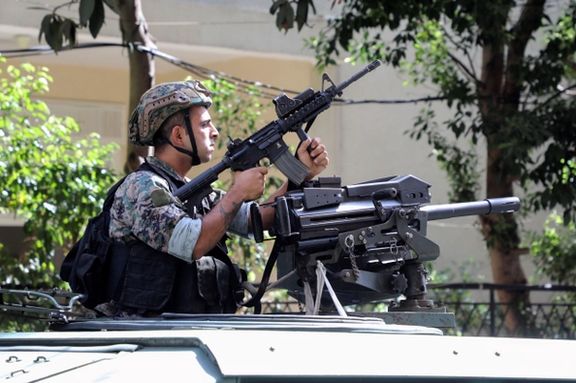
A Lebanese judge on Monday charged 68 people including 18 detainees with murder and incitement to sectarian strife over fatal clashes this month in Beirut.
Seven followers of Lebanon's Shiite Iran-backed Hezbollah group and its ally, the Amal Movement, were killed on Oct. 14 in the worst street violence in Beirut in over a decade.
The gunfire began as protesters assembled for a demonstration called for by Hezbollah and Amal against Judge Tarek Bitar, who is leading an investigation into an explosion at Beirut port that killed over 200 people on Aug. 4 last year.
Monday's charges were filed by Judge Fadi Akiki, a government representative at the military court. They also include charges of attempted murder, possession of unlicensed weapons and destruction of public and private property.
The case was referred to an investigative judge.
Hezbollah has accused the Christian Lebanese Forces party of targeting demonstrators with sniper fire.
The party's leader, Samir Geagea, has denied the allegations and said residents of the Christian-majority Ain al-Remmaneh area, where the violence took place, had acted in self-defense.
In a local television interview last week, Geagea said the trouble began when supporters of the Shi'ite Muslim parties entered the neighborhood and vandalized cars, and that four residents were wounded before a shot was fired.
Footage released later appeared to show at least one person being shot by a soldier.
Report b y Reuters
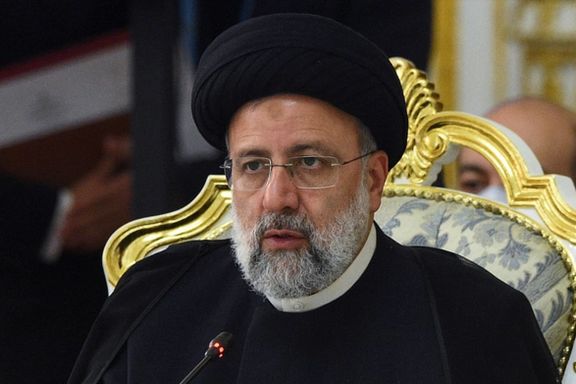
Iran's President Ebrahim Raisi has made enough gaffes in just two months to be advised by a newspaper to seriously consider prevention and damage control.
The reformist paper Etemad Monday in a commentary headlined ‘To Be Read by President’s Advisers,’ lambasted blunders by President Ebrahim Raisi, suggesting they would destroy his self-confidence.
In the past two months Raisi (Raeesi) has uttered several malapropisms and made other errors in his public appearances and speeches, leading to comparisons with United States presidents Donald Trump, Ronald Reagan and George W Bush, whose gaffes and blunders spawned the term 'Bushism' and several books.
Unlike most Iranian clerics such as the 82-year-old Supreme Leader Ali Khamenei who are confident, eloquent public speakers, the 61-year-old cleric now steering Iran's government is clearly no orator. In fact, he often looks quite uneasy when addressing the public.
Raisi made two awkward gaffes last week. In a speech in Ardabil when speaking about the region's cultural heritage, he referred to the Safavid-era Shia scholar, Ahmad ibn Muhammad Ardabili, by two of his titles Mohaghegh (researcher) and Mughaddas (sanctified) as if Mohaghegh Aradabili and Mughaddas Ardabili were two separate characters.
"In our time we neither understood Mohaghegh Aradabili, nor Mughaddas Ardabili," Raisi said.
As a senior cleric who has studied Shia theology and jurisprudence in seminaries for many years this came as a surprise to many even his supporters who are hard at work on social media to whitewash the mistake.
In a speech at the International Islamic Unity Conference, also last week, Raisi referred to the Turkish-born Sunni Muslim scholar Mohammed Said Ramadan al-Bouti − killed in the Syrian war in 2013 and known as "Shaykh of the Levant" − as Shaykh Touti. This was particularly amusing for Iranian social-media users given 'touti' translates as 'parrot'.
Critics have pointed out that Raisi is even not comfortable reading prepared speeches. He read his address to the Shanghai Cooperation Organization (SCO) summit in Tajikistan in September from a prepared text but repeatedly failed to follow the words and mispronounced them so in his speech "belt road" turned into "belt and road" – referring to China’s massive international infrastructural plan – mixed with some other mispronounced words when speaking about a transit project.
The Etemad commentary wrote that Raisi's gaffs would embarrass Iran and that the presidential staff needed to follow the example of White House chief of staff Michael Deaver and presidential adviser David Gergen during the Reagan presidency.
"Gaffes lead to more gaffes,” Etemad observed. “A politician will gradually lose his self-confidence if he makes repeated gaffes and will make even more.” The paper drew a comparison with a volleyball game going badly when the coach "should take a time out" and stop further losses by talking to players.

An official has said that Iran has now the lowest birth rate in the Middle East after experiencing the fastest decline in births during the past three decades.
Saleh Ghasemi, head of the Center for Strategic Research on Population told a local news agency that the current birth rate is 1.6 for each woman at the age of fertility. He added that in mid-1980s Iran had a 6.5 birth rate, one the highest in the world, but it has been declining since.
Ghasemi put Iran’s population at more than 85 million, although some believe that this figure includes a few million Iranians who have left the country but are still counted as residents. He added that the population growth rate is currently 0.6 percent but is expected to decline to zero in the next 10-15 years.
Iran’s declining rate of population growth has been a hot political topic in the country, where its Supreme Leader Ali Khamenei and senior clerics in the religious political system have been calling for policies to boost population.
Ghasemi said that the biggest decline in births took place between 2015-2020, when there were 550,000 fewer births annually. He went on to say that women born in the 1980s are dropping out of the child-bearing age. This, coupled with change in people’s preferences and lifestyle will continue to reduce births.